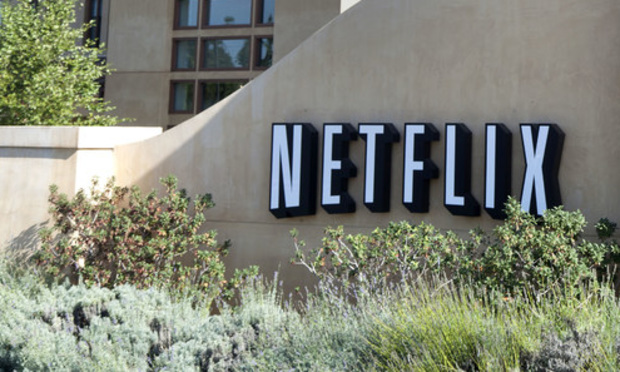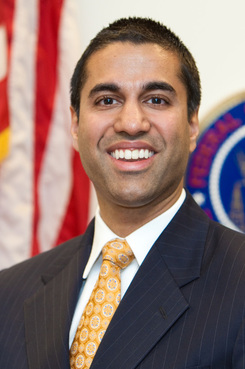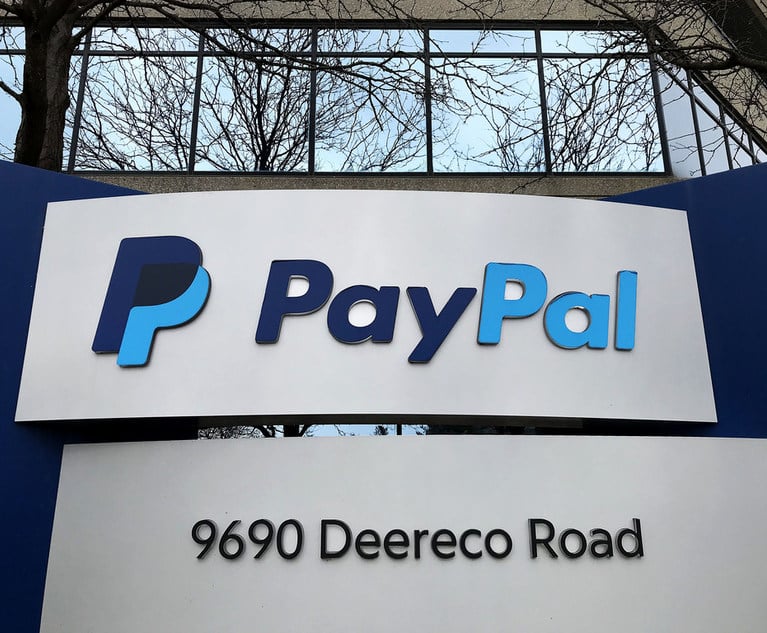What Major Companies Told the FCC in the Run-Up to Repealing 'Net Neutrality'
Here's a snapshot of what some of the biggest U.S. law firms—on behalf of their clients—told the FCC in recent months.
November 21, 2017 at 06:51 PM
8 minute read
 Netflix headquarters in California. Credit: Jason Doiy/ ALM
Netflix headquarters in California. Credit: Jason Doiy/ ALM When the Federal Communications Commission fended off a challenge last year to new regulations aimed at ensuring equal access to the internet, the victory appeared to bring an end to a long-running saga that featured two earlier trips to Washington's federal appeals court.
In the era of President Donald Trump, no regulation is safe.
Within a year, it became a real possibility the FCC's third-time's-the-charm defense would live on only on the docket of the U.S. Court of Appeals for the D.C. Circuit.
 Ajit Pai
Ajit PaiSignaling his intention to undo those rules, FCC Chairman Ajit Pai asked earlier this year for comments on—as the commission put it—“returning to the bipartisan, light-touch regulatory framework that saw the free and open Internet flourish prior to the 2015 adoption of the Commission's Title II Order.” On Tuesday, Pai followed through by announcing plans to do just that.
“Under my proposal, the federal government will stop micromanaging the internet,” Pai said in a statement. “Instead, the F.C.C. would simply require internet service providers to be transparent about their practices so that consumers can buy the service plan that's best for them and entrepreneurs and other small businesses can have the technical information they need to innovate.”
The FCC's move is certain to reopen a debate about regulation of the internet and is likely to lead to yet another lawsuit over the FCC's approach. In response to the FCC's request for comments, several companies—many of them with lawyers from top firms—drew the battle lines for that upcoming debate.
New York Attorney General Eric Schneiderman on Tuesday raised questions about the veracity of the FCC's comment process. His office said researchers and reporters this year discovered “enormous numbers of fake comments” were flooding in about the possible repeal of net neutrality rules.
Here's a snapshot of what some of the biggest U.S. law firms—on behalf of their clients—told the FCC in recent months.
Gibson, Dunn & Crutcher, for Verizon
“Verizon faces competition nearly everywhere we offer broadband Internet access services. For wireless services, multiple providers compete head-to-head almost everywhere that consumers live. And where competition exists, providers are eager to grow their market share and compete aggressively to respond to consumer demands. In this atmosphere, a flexible regulatory framework—not prescriptive, last-century regulation—makes sense. Regulatory requirements can protect consumers, but they shouldn't handcuff innovation.” (For Gibson Dunn: Helgi Walker, Michael Huston, Russell Balikian. For Verizon: Katharine R. Saunders)
Netflix
“Netflix supports strong net neutrality. Because Netflix believes the internet should be open, we do not support rolling back existing net neutrality protections as the FCC has proposed to do in the Restoring Internet Freedom Notice of Proposed Rulemaking. Companies, consumer groups and millions of citizens have weighed-in to voice their support for an open internet. They understand that the future of the internet is the future of civic engagement, free speech, innovation and economic development. Failing to protect the internet's openness is the equivalent of shutting down Main Street, Wall Street and the public square, all rolled into one.
Since the beginning of this century, the Federal Communications Commission has struggled to solidify and sustain an open internet policy. Two years ago the FCC adopted strong net neutrality rules to protect consumers and innovation. One year ago, a court of appeals validated the FCC's rules, providing policy and legal certainty that the internet would remain open. Unfortunately, the FCC is now proposing to walk back from those protections and that 4 certainty.” (For Netflix: Corie Wright, director of global public policy)
Latham & Watkins, for NCTA—The Internet & Television Association
“NCTA supports the fundamental openness principles that have long undergirded the Internet economy and ensured free and unimpeded access to online content for all consumers. The NPRM sensibly recognizes that the best way to safeguard these principles while promoting broadband investment and innovation is to restore the information service classification that has enjoyed bipartisan support and helped drive the Internet's dynamism for nearly two decades, and to work with stakeholders on establishing a policy framework that will maximize benefits for consumers. NCTA welcomes the opportunity to work closely with the Commission on accomplishing these important objectives.” (For Latham & Watkins: Matthew A. Brill Matthew T. Murchison Ryan C. Grover. For NCTA: Rick C. Chessen Neal M. Goldberg Michael S. Schooler Steven F. Morris)
Sidley Austin, for AT&T
“We continue to support a reasonable regulatory or legislative framework that is calibrated to protect an open Internet without undermining investment and innovation incentives. And regardless of what regulatory regime is in place, we will conduct our business in a manner consistent with an open Internet. Our customers demand no less. The question is thus not, as the Title II Order framed it, whether the broadband Internet should remain an open platform “for innovation, job-creation and entrepreneurialism” and for “freedom of expression and the sharing of ideas around the world.” Of course it should, and it will. The question instead is: which rules actually promote that objective, and which rules do more harm than good? Viewed from that perspective, the Title II Order was an unprecedented regulatory overreaction. It grossly exaggerated the need for public-utility-style regulation while ignoring its costs.” (For Sidley: Jonathan Nuechterlein, C. Frederick Beckner III, James Young, Kathleen Mueller)
Akin Gump Strauss Hauer & Feld, for Nominum
“In reassessing the framework for ensuring a free and open Internet continues to thrive, Nominum supports the broad goals set out by the commission to ensure consumer protections and afford ISPs the flexibility to innovate. By continuing to support a framework that protects against blocking and throttling and adopts a transparency regime that provides meaningful disclosure, the commission can help ensure that consumers are able to experience the Internet consistent with their expectations and with a clear understanding of how their ISPs can assist them in achieving that experience. The commission also can ensure that the Internet remains a vibrant and more secure engine for economic opportunity by providing a flexible framework when it comes to reasonable network management practices. ISPs and the ecosystem of vendors need the certainty to invest in developing new and innovation solutions that enhance the subscriber's experience, provide better security, and place more choices in the hands of subscribers.”
Jenner & Block, for Charter Communications Inc.
“Being able to offer the quality services our customers expect requires continuous investment in our network. Much of our success in providing ever-faster broadband and connecting more Americans to our advanced network has been the result of massive investments that we made under the prior light-touch, predictable regulatory environment. Charter is thus broadly supportive of the Commission's efforts to ensure a predictable regulatory environment in which broadband providers can plan such investments reliably. By contrast, the Commission's reclassification of internet access services as Title II services imposed, upon an innovative and dynamic industry, a regulatory framework that had been 3 designed for a stagnant, century-old phone system. The broad and vague prohibitions of Title II create a destabilizing regulatory environment that discourages innovation, both in the delivery of service and in the underlying network infrastructure. Of equal or even greater importance, by leaving market participants unclear about which business models, services, or innovations regulators will permit, either today or in the future, this uncertainty undercuts the continuous private investment needed for the internet to flourish. Indeed, capital expenditures have decreased among broadband providers as a whole since the Commission's Title II reclassification decision.” (For Jenner & Block: Samuel Feder, Luke Platzer, Samuel Jacobson. For Charter: Christianna Barnhart, vice president of regulatory affairs.)
Boies Schiller Flexner, for Cogent Communications Inc.
“In addition to better conforming with the Commission's authorizing statutes, exercising Title II authority is more in line with promoting broadband deployment and Internet freedom. As explained above, prior to exercising this authority, certain BIAS providers demonstrated an ability and willingness to take actions that harmed consumers to further the providers' own ends. Any diminished amount of 32 investment that has occurred, as the NPRM speculates,64 thus must be offset by the harms consumers will be confronted with following repeal of the Title II Order.” (For Boies: Robert Cooper, Hershel Wancjer and James Kraehenbuehl)
This content has been archived. It is available through our partners, LexisNexis® and Bloomberg Law.
To view this content, please continue to their sites.
Not a Lexis Subscriber?
Subscribe Now
Not a Bloomberg Law Subscriber?
Subscribe Now
NOT FOR REPRINT
© 2025 ALM Global, LLC, All Rights Reserved. Request academic re-use from www.copyright.com. All other uses, submit a request to [email protected]. For more information visit Asset & Logo Licensing.
You Might Like
View All
Pistachio Giant Wonderful Files Trademark Suit Against Canadian Maker of Wonderspread
4 minute read
Hogan Lovells, Jenner & Block Challenge Trump EOs Impacting Gender-Affirming Care
3 minute read
Gen AI Legal Contract Startup Ivo Announces $16 Million Series A Funding Round

PayPal Faces New Round of Claims; This Time Alleging Its 'Honey' Browser Extension Cheated Consumers
Trending Stories
Who Got The Work
J. Brugh Lower of Gibbons has entered an appearance for industrial equipment supplier Devco Corporation in a pending trademark infringement lawsuit. The suit, accusing the defendant of selling knock-off Graco products, was filed Dec. 18 in New Jersey District Court by Rivkin Radler on behalf of Graco Inc. and Graco Minnesota. The case, assigned to U.S. District Judge Zahid N. Quraishi, is 3:24-cv-11294, Graco Inc. et al v. Devco Corporation.
Who Got The Work
Rebecca Maller-Stein and Kent A. Yalowitz of Arnold & Porter Kaye Scholer have entered their appearances for Hanaco Venture Capital and its executives, Lior Prosor and David Frankel, in a pending securities lawsuit. The action, filed on Dec. 24 in New York Southern District Court by Zell, Aron & Co. on behalf of Goldeneye Advisors, accuses the defendants of negligently and fraudulently managing the plaintiff's $1 million investment. The case, assigned to U.S. District Judge Vernon S. Broderick, is 1:24-cv-09918, Goldeneye Advisors, LLC v. Hanaco Venture Capital, Ltd. et al.
Who Got The Work
Attorneys from A&O Shearman has stepped in as defense counsel for Toronto-Dominion Bank and other defendants in a pending securities class action. The suit, filed Dec. 11 in New York Southern District Court by Bleichmar Fonti & Auld, accuses the defendants of concealing the bank's 'pervasive' deficiencies in regards to its compliance with the Bank Secrecy Act and the quality of its anti-money laundering controls. The case, assigned to U.S. District Judge Arun Subramanian, is 1:24-cv-09445, Gonzalez v. The Toronto-Dominion Bank et al.
Who Got The Work
Crown Castle International, a Pennsylvania company providing shared communications infrastructure, has turned to Luke D. Wolf of Gordon Rees Scully Mansukhani to fend off a pending breach-of-contract lawsuit. The court action, filed Nov. 25 in Michigan Eastern District Court by Hooper Hathaway PC on behalf of The Town Residences LLC, accuses Crown Castle of failing to transfer approximately $30,000 in utility payments from T-Mobile in breach of a roof-top lease and assignment agreement. The case, assigned to U.S. District Judge Susan K. Declercq, is 2:24-cv-13131, The Town Residences LLC v. T-Mobile US, Inc. et al.
Who Got The Work
Wilfred P. Coronato and Daniel M. Schwartz of McCarter & English have stepped in as defense counsel to Electrolux Home Products Inc. in a pending product liability lawsuit. The court action, filed Nov. 26 in New York Eastern District Court by Poulos Lopiccolo PC and Nagel Rice LLP on behalf of David Stern, alleges that the defendant's refrigerators’ drawers and shelving repeatedly break and fall apart within months after purchase. The case, assigned to U.S. District Judge Joan M. Azrack, is 2:24-cv-08204, Stern v. Electrolux Home Products, Inc.
Featured Firms
Law Offices of Gary Martin Hays & Associates, P.C.
(470) 294-1674
Law Offices of Mark E. Salomone
(857) 444-6468
Smith & Hassler
(713) 739-1250






